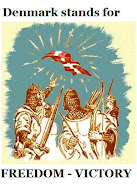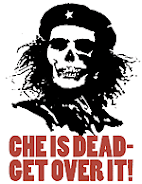 Two good friends - Two defenders of our liberties.
Two good friends - Two defenders of our liberties.
Danish Prime Minister Anders Fogh Rasmussen is one of the two foreign heads who have had the honor to visit Camp David in George Walker Bush's Presidency, the other foreign head was Vladimir Putin.
The Danish influence and importance for the USA is indeed disproportional huge in contrast to the size of the country.
The Danish effort in Afghanistan is exceptional good.
From: AP
CRAWFORD, Texas (AP) — With a smile and shout of "Yee-haw," President Bush began talks Friday at his Texas ranch with the prime minister of Denmark, a U.S. ally and partner in NATO's mission to combat resurgent Taliban and al-Qaida fighters in Afghanistan.
Bush and Prime Minister Anders Fogh Rasmussen are focused on the changing role of the alliance ahead of the NATO summit in April in Bucharest, Romania. The visit comes at a critical time, with the Bush administration pressing NATO members to send more troops to Afghanistan and better coordinate nonmilitary assistance.
"Welcome to the promised land," Bush said as he welcomed Fogh Rasmussen to the ranch, a diplomatic coup for top U.S. allies and Bush's favorite foreign friends.
Fogh Rasmussen is not only the latest VIP that Bush and first lady Laura Bush have hosted at the ranch. The Danish leader is also a very important biking buddy. The two, who pedaled around Camp David in 2006, are expected to go mountain biking during their three-night stay at the ranch.
The Danish prime minister and his wife, Anne-Mette Rasmussen, will dine Friday night on beef tenderloin, green chili cheese grits souffle, asparagus, salad and pecan pie. The pecans for the pie and the wood used to smoke the tenderloin were harvested from pecan trees at the ranch.
Bush had time to cast a fishing line a few times into a pond on his property before their guests arrived. As Fogh Rasmussen and his wife landed on a helipad at the ranch, the Bushes pulled up in a white pickup truck. The president already was perspiring in the 70-plus degree temperatures when he shook hands with Fogh Rasmussen. After posing for photographs, the foursome drove off in the truck.
Their wide-ranging discussion will cover Afghanistan — where Denmark is playing a role in both security and reconstruction assistance — and Iraq where Denmark has contributed to stability efforts since 2003, said Gordon Johndroe, a spokesman for the National Security Council.
Johndroe, speaking to reporters at the White House where Bush met with NATO Secretary-General Jaap de Hoop Scheffer before leaving for the ranch, said other topics likely will include developments in the Middle East, Kosovo's declaration of independence, climate change and U.S. and Danish assistance to Africa.
Denmark has decided to oppose any debt relief for Sudan after the African nation's leader urged the Muslim world to boycott Danish goods because of a reprinted controversial cartoon of the Prophet Muhammad. Denmark, however, will not cut development aid to Sudan.
John Negroponte, deputy secretary of state, accompanied Bush to Texas.
The United States and other nations that have troops in dangerous areas of southern Afghanistan are trying to persuade Germany, France and other NATO nations to not only send more troops but also to let them fight in the south.
In a speech in Washington, de Hoop Scheffer pleaded to the United States to temper public expression of its concerns that some European allies aren't doing enough in Afghanistan. U.S. officials, including Defense Secretary Robert Gates, have repeatedly vented frustration that appeals for more troops — and for permission for commanders to use them with fewer restrictions — have fallen flat. Gates has even warned of a fissure within the alliance over the issue.
"Clearly there is a perception on the part of some NATO allies that others are not pulling their weight," de Hoop Scheffer said. "Notably here in the United States there is a palpable feeling that some European allies are underperforming in Afghanistan, that they are either unable or unwilling to make a greater effort. In my view we simply cannot afford to play the blame game and can even less afford to play it publicly."
But de Hoop Scheffer also made clear that he believes the alliance must show more solidarity by eliminating the many restrictions — or caveats, as they are known within NATO — that some members have imposed on how and where their troops can be used in Afghanistan.
A senior administration official said Friday that while there should be no expectation of "a surge of NATO" to come out of the Bucharest meetings, there are likely to be "announcements that will be helpful." The official, who spoke on condition of anonymity to more candidly describe White House thinking, did not elaborate. But there are increasing signs that France, under the new leadership of President Nicolas Sarkozy, appears ready to answer the repeated calls from the U.S. and other allies to step up in Afghanistan.
































No comments:
Post a Comment